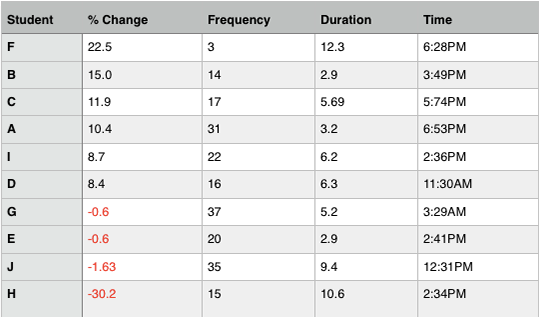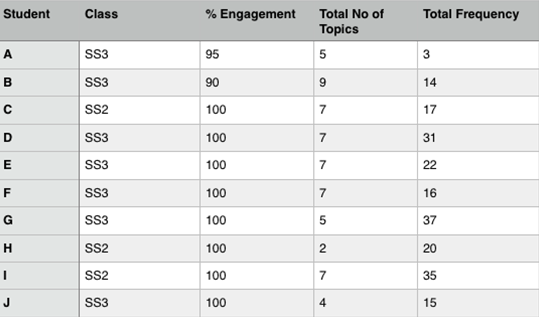Recently, we published the first of this series in a bid to share insights from the Efiko pilot, on how mobile technology can be used to supplement learning in secondary schools. In this release, we focus on patterns of usage, and identify the effects, if any, on student performance. As with the earlier published edition, we focus on the first objective of the Efiko pilot, which is: whether mobile technology can be used to provide acces to rich & engaging content to target audience beyond the limitations of schools and communities.
Time, Duration and Frequency of Play
To address the first objective, we took a random sampling of 10 students, and compared their scores before using Efiko, and while using Efiko during the pilot.
60% of the students represented above experienced an average of a 12.9% increase in performance, while the other 40% had an average of an 8.3% decrease. The table below provides more detail and maps the frequency (how often), duration (how long) and time (average time of day) of play.
Ordering by percentage change, and in descending order, there doesn’t appear to be any obvious correlation between student performance and the frequency and duration of their play. In contrast, students who experienced a greater percentage increase in performance appear to be those who played Efiko after school hours. This connotes that these students had access to devices outside of school, and therefore were willing (or able) to continue learning outside of school hours.
Content Engagement
The Efiko platform helps students learn by providing access to topical based quizzes. By using the app students are able to interact with content in-line with the academic curriculum. Students are then able to target their learning based and tailor it around lessons learnt while in the classroom, or any other personal preference.
The table below shows the class each student belongs to, as well as the level of content they engaged with according to their class syllabus. A 100% engagement implies that students only interacted with content inline with their syllabus.
80% of the sample above used Efiko in line with the school calendar. Only 20% of the sample spent 5% and 10% respectively on content outside their direct class schedule. On average however, students studied a total of 7 different topics on the app.
Later this week, we continue the series as we analyse the overall performance of each of the participating schools, beginning with schools based in Lagos.
About Efiko
Efiko is a mobile quiz platform for secondary school students designed to stimulate and personalise the learning experience beyond the school environment. Since inception in 2012, the Efiko user base has grown to a little over twenty-seven thousand users, across 32 different states nationwide.





